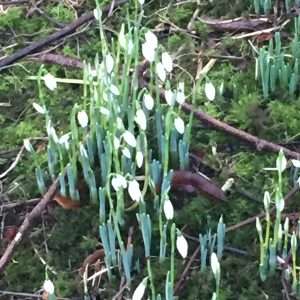The borders of counties Wicklow and Wexford, from the snowdrops of Altamont Gardens to the canvases of the Gaslamp Gallery in Gorey. From beauty to beauty, it was a day to lean against the car window and contemplate the passing scenery.
At one point, deep in the countryside, there was a cottage at the roadside. Curtainless windows and an unkempt garden suggested the home was uninhabited. Beside it, surrounded by long grass, stood a tractor. At some point, perhaps years past, someone had reversed that tractor into the place where it stood. Someone had stepped down from the driving seat, walked across the yard, and gone through the door of the house. Someone had finished their day’s work and had they sensed that there were no further such days?
What had happened after the final time that tractor had been driven? Had there been a sudden illness? Had someone died? If they had known there would be no more journeys, would they have parked there, or driven to the house of a neighbour? If they had known there would be no more journeys, would they have just parked the tractor and walked placidly to the door? The answers to such questions can only be imagined.
If we knew we were doing something for the very last time, driving a car, visiting a loved destination, going through a doorway, how would we feel? It is hard to imagine the thoughts of that tractor driver without feeling sadness.
A moment described in Colm Tóibín’s The Master is recalled. Henry James finds a house in Rye in southern England in which to live, a house which feels as though it is the very place for which he has been searching, but also a house which has a profound impact upon his thinking. Tóibín writes,
“ . . . something other than mere arrangements filled him with a vague, unnameable foreboding. It took him weeks to understand what it was and then it came to him in a flash: when he walked into the upstairs rooms of Lamb House, and into the room where he himself would sleep, he believed that he had come into the room where he would die. As he studied the lease, he knew that its twenty-one years would take him to the tomb. The walls of the house had witnessed men and women come and go for almost three hundred years; now it had invited him to sample briefly its charm, it had enticed him there and offered him its unlasting hospitality. It would welcome him and then see him out, as it had seen others out. He would lie stricken in one of those rooms; he would lie cold in that house. The idea both froze his blood and comforted him at the same time. He had travelled without hesitation to meet his own place of death, to remove its mystery, one of its unknown dimensions. But he would also go there to live, to spend long days working and long evenings by the fire. He had found his home, he who had wandered so uneasily, and he longed for its engulfing presence, its familiarity, its containing beauty”. The Master, p.132
If the driver had approached the door of the cottage in the mood with which Henry James approached Lamb House, would he not have returned to the tractor and driven from the yard? Do we ever contemplate our end with such a degree of equanimity?
